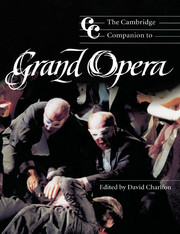Book contents
- Frontmatter
- 1 Introduction
- Part I The resourcing of grand opera
- Part II Revaluation and the twenty-first century
- Part III Grand operas for Paris
- Part IV Transformations of grand opera
- 16 Richard Wagner and the legacy of French grand opera
- 17 Grand opera in Russia: fragments of an unwritten history
- 18 Grand opera among the Czechs
- 19 Italian opera
- 20 Grand opera in Britain and the Americas
- Notes
- Select bibliography
- Index
17 - Grand opera in Russia: fragments of an unwritten history
from Part IV - Transformations of grand opera
Published online by Cambridge University Press: 28 November 2011
- Frontmatter
- 1 Introduction
- Part I The resourcing of grand opera
- Part II Revaluation and the twenty-first century
- Part III Grand operas for Paris
- Part IV Transformations of grand opera
- 16 Richard Wagner and the legacy of French grand opera
- 17 Grand opera in Russia: fragments of an unwritten history
- 18 Grand opera among the Czechs
- 19 Italian opera
- 20 Grand opera in Britain and the Americas
- Notes
- Select bibliography
- Index
Summary
This reminded Nikolai Andreyevich [Rimsky-Korsakov] of an incident which he related to me as follows: There was a run-through of Snegurochka. Evidently Napravnik didn't care for it very much, because while he was listening to it he thought of nothing except how he could make every conceivable cut. It was terribly long, he claimed. Rimsky-Korsakov ended, saying (When I protested that in fact they do put on long operas, and cited Les Huguenots as a case in point, he couldn't take any more, and in ill temper he declared categorically that my argument didn't prove anything since Les Huguenots is a living work while my Snegurochka is just - dead.'
v. yastrebtsev, reminiscences of rimsky-korsakovThe familiar story of Russian opera in the nineteenth century begins in 1836, when the first performance of Glinka's A Life for the Tsar inaugurated Russian nationalism in music, and at the same time gave Russia its first all-sung opera. After this brief flash, two dark decades followed, when Russian audiences were distracted by the superficial brilliance of Italian opera, until a succession of powerful operas by Musorgsky, Borodin, Rimsky-Korsakov and Tchaikovsky established Russia as a nation with a great operatic culture of its own. Such was the account provided by Soviet writers, and such is the account that has largely been accepted in the West. But this conflicts violently with events on the Russian stage during the nineteenth century, when many operas left out of the account enjoyed commercial success and critical prestige and, conversely, the operas figuring in the account were often failures in their earlier productions. The present canon of nineteenth-century Russian opera certainly owes little to the perceptions of nineteenth-century Russian audiences, critics and musicians.
- Type
- Chapter
- Information
- The Cambridge Companion to Grand Opera , pp. 344 - 365Publisher: Cambridge University PressPrint publication year: 2003



